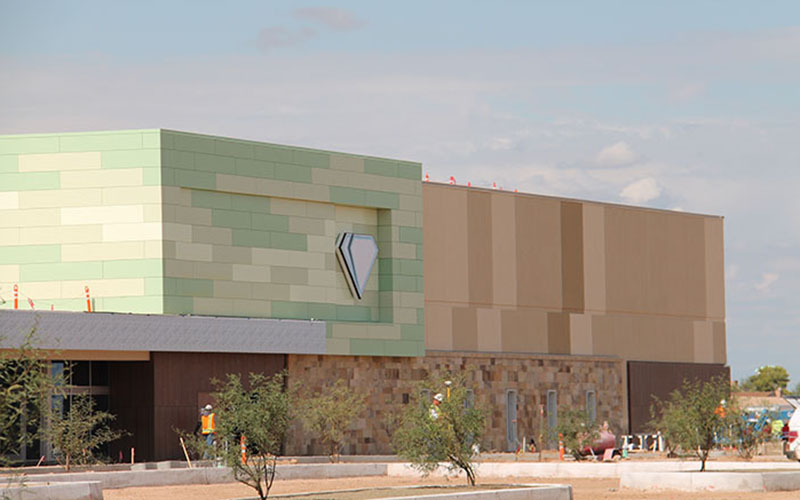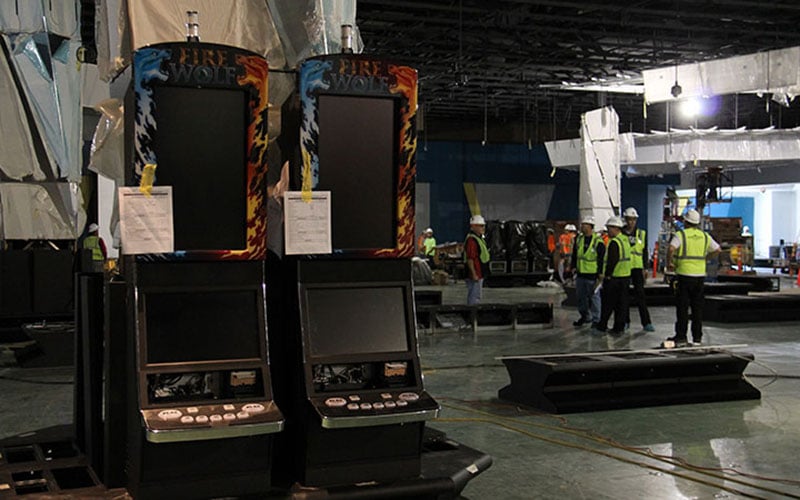
The Tohono O’odham Nation acquired 135 acres in Glendale that converted to reservation land, where the tribe will soon open the Desert Diamond-West Valley resort and casino. (Photo by Megan Siquieros/Desert Diamond)

Slot machines await installation on the floor of the Desert Diamond casino and resort, some of the more than 1,000 gaming devices at the facility, which is set to open Dec. 20. (Photo by Megan Siquieros/Desert Diamond)
WASHINGTON – A federal appeals court Friday upheld a lower court’s ruling that prevented the city of Glendale from annexing land in an effort to block a planned Tohono O’odham casino there.
The ruling by a three-judge panel of the 9th U.S. Circuit Court of Appeals is the latest in a string of victories for the tribe, which is just weeks away from a planned Dec. 20 grand opening of the Desert Diamond-West Valley resort and casino.
The court said it was “abundantly clear” that HB 2534, a state law authorizing the annexation, would have violated a federal law that let the Tohono O’odham Nation replace reservation land that was lost when the government damned part of the Gila River.
The Arizona Attorney General’s Office declined comment on the ruling. But the decision was met with praise from the tribe, whose leader said it’s time to move forward.
“It is time for the state of Arizona to stop its costly attempts to kill more than 500 new jobs here in Arizona,” said Tohono O’odham Chairman Edward Manuel in a statement released by the tribe.
Friday’s ruling was the “18th favorable court and federal agency ruling” on the Glendale casino for the tribe, the statement said.
The case has its roots in 1960, when a dam built on the Gila River led to years of flooding on the Tohono O’odham reservation, causing damage that left the reservation economically unviable.
In 1986, Congress voted to buy 9,880 acres of damaged reservation land and let the tribe buy a like amount of land in Arizona, as long as the replacement land was in Maricopa, Pinal or Pima counties and outside the incorporated area of any city or town.
In 2003, the tribe bought 135 acres of “county island” – Maricopa County land that is surrounded by the city of Glendale but is not part of the city. The fight began in earnest in 2009, when the tribe announced plans for a casino on the land and began the process of having it declared reservation land by the federal government.
One of the challenges was HB 2534, a 2011 state law that would have let the city annex 54 acres known as Parcel 2, where the casino was to be located. Annexation would have prevented the property from being converted to reservation land.
The tribe challenged the law and a lower court agreed, saying the Gila Bend Indian Reservation Lands Replacement Act – the law that let the tribe replace the land it lost – pre-empted the state law.
The circuit court agreed Friday, ruling that allowing annexation would “effectively block the trust application. This directly bars the Nation’s effort to incorporate purchased land into tribal land.”
“Under the circumstances of this case, HB 2534 stands as a clear and manifest obstacle to the purpose of the act,” Circuit Judge Milan Smith wrote in his opinion for the court.
Since this particular suit was filed by Glendale and the state, the city has dropped its opposition and decided to support the casino, according to the tribe.
“The city of Glendale dropped out of this lawsuit long ago after finding that the state’s arguments were unfounded,” the tribe’s statement said. “Glendale supports this major economic development project, together with multiple other Arizona cities.”
The state could appeal to the Supreme Court. But even if it doesn’t, there might still be hurdles for the casino.
Federal lawmakers from Arizona introduced bills in the House and Senate to “prohibit gaming activities on certain Indian lands in Arizona until the expiration of certain gaming compacts.” The Keep the Promise Act of 2015 would effectively prohibit any casino on the tribe’s Glendale land from operating until at least 2027.
The House bill has come out of committee but has yet to receive a floor vote. The Senate bill is still in committee.
For now, it’s full speed ahead for the tribe as it prepares for the casino opening.
“Hiring is well underway, with 400 of the more than 500 permanent positions at the casino already filled,” the tribe’s release said. “Nearly half of the 1,089 gaming devices have already been installed on the casino floor as construction nears completion.”